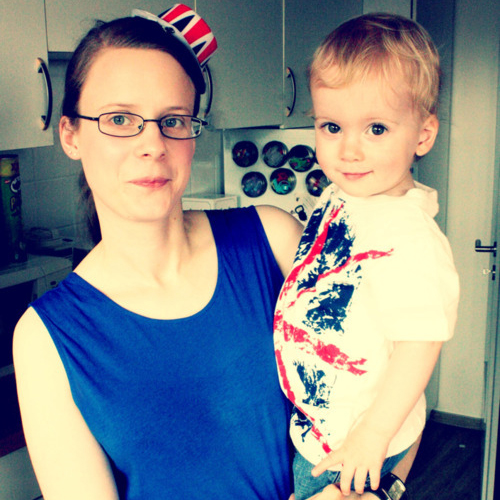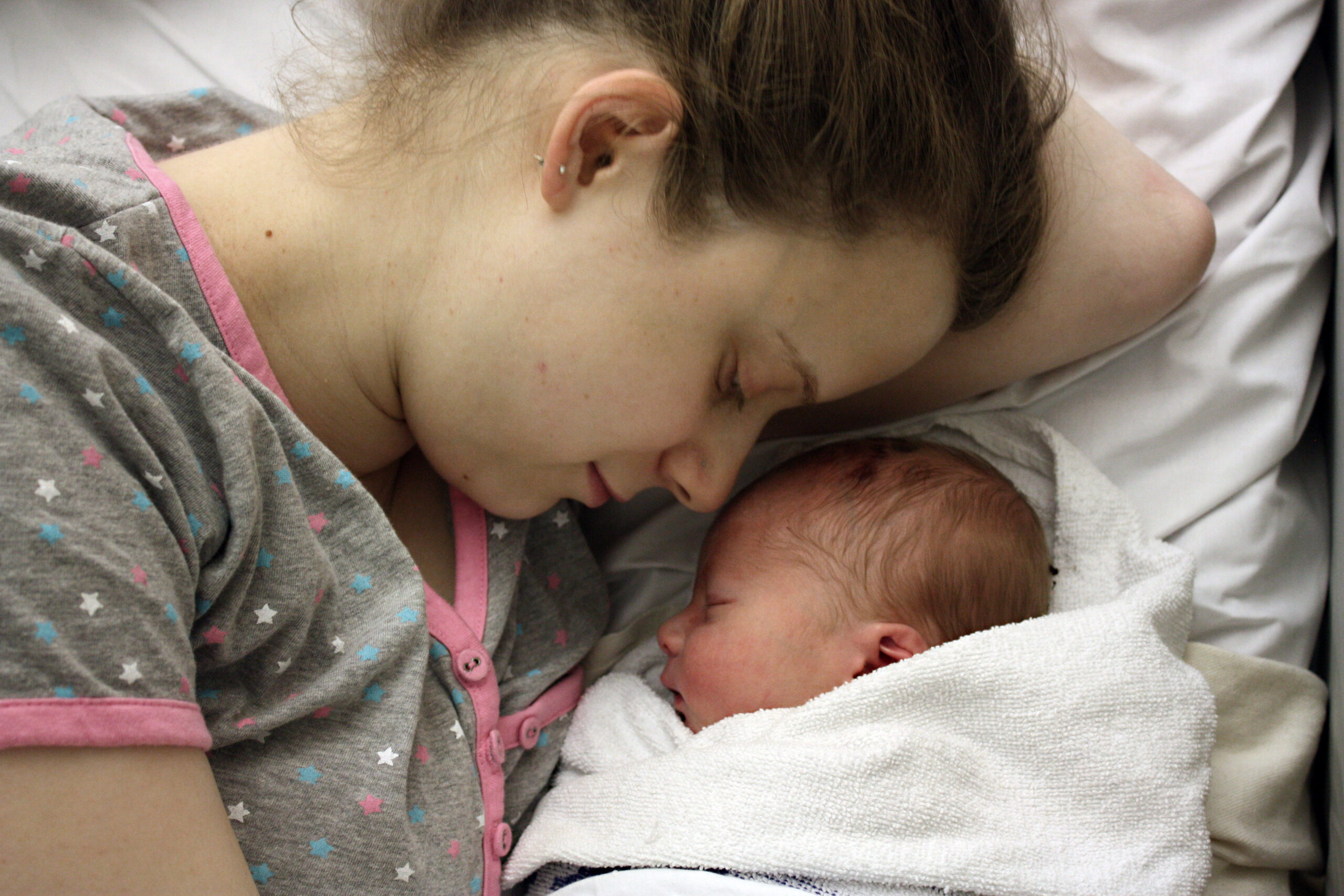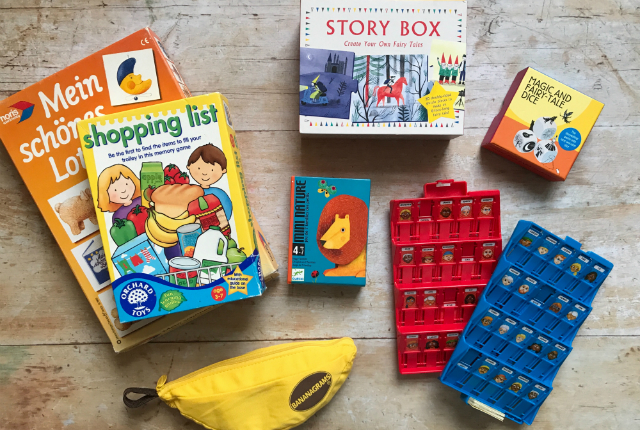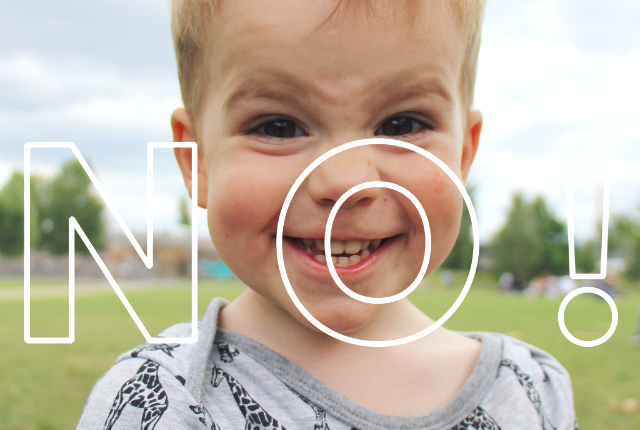
Thoughts on…raising bilingual children
People are often confused by my German sounding surname and my native command of English. My equally native command of German, yet my frequent interjections of “in English we say…”. Truth is, I was born in Germany, to German parents, but moved to Scotland when I was 4.5 years old. It was the first of several moves back and forth between the two countries, but overall I’ve spent more than half my life in Scotland. I went to school there and studied there, worked there, got married there and had our first child there. While German is technically my first language and ‘mother tongue’, I learned to read and write in English first. I think in English, and usually take notes in English even when sitting in a German meeting e.g. at work. And to this day, I prefer to read books in English. But at the same time, I also hold a fondness for my ‘mother tongue’, with its ridiculously long compound words that The Husband likes to make fun of, and its confusing ‘der, die, das’ articles and their variants, which drive him to despair. I’m glad I never had to learn them, and can just rely on my instinct to know which is the right one.
Now I have children of my own. Even before I was pregnant the first time, people would ask if we planned to raise any children we would have bilingually. The short answer is, yes. We never really thought twice about it. We didn’t sit down and discuss the pros and cons. It was always the obvious choice for us. But *how* we would do it, that we did discuss. Would we go down the OPOL (one parent, one language) route, or would we choose to follow the ‘minority language at home’ school of thought. The latter is what I grew up with as a child, living with my German family in Scotland. We spoke German at home and amongst ourselves, and English at school and elsewhere, or when there were non German speakers around. Mostly. But I’ll come back to that. However, that would only have worked if, like my parents, we were both fluent German speakers, so we decided that The Husband would only speak English to our son, and I would only speak German. Which mostly worked, because sometimes I just automatically slipped in to English as that’s what I was used to speaking on a daily basis. It’s difficult to change habits overnight, even with the best intentions.
When we moved to Berlin, almost four years ago now, we originally continued with OPOL. Then our son started attending a German speaking nursery just after he turned one. He started talking when he was about two years old, a little later than his peers, but that was something we were fully prepared for as it’s not uncommon in children who are bilingual from birth. Around the age of 2.5, by which time he was babbling away in full sentences, we noticed that his English was lagging behind a lot. Since he was at nursery or around me all day, and only spoke English with his dad for the brief periods between work and bedtime, and at the weekends, his German was coming along in leaps and bounds, and his English was suffering. So we switched to everyone speaking English at home, and soon noticed an improvement.
The idea was, that we all speak the minority language, English, at home, and outside of home we would speak German. Or at least I would speak German and The Husband would try to as much as he could. But in reality, The Husband speaks English most of the time, and I switch back and forth constantly, half of the time I don’t even notice. Because that’s what I have done all my life. Other families are more consistent, where parents will strictly stick to ‘their’ language only, even in the presence of others. They’ll translate for any onlookers that don’t understand, and explain the OPOL method, rather than use the ‘other’ language with their child. And I applaud them. I really do. If that’s what works for them, I admire their ability to be so consistent. It just doesn’t work for me. Maybe it’s easier if you identify more strongly, or more exclusively, with just one language. But for me, German and English both come naturally. I can’t rely on my instinct to help me consistently stick to just one. Because my instinct is what makes me switch – it pulls out whatever seems most relevant, or comes most instinctively in the given moment. Sometimes it’s from situation to situation, often it’s mid sentence. But actually, my mum now tells me we weren’t that consistent either back then. For example. I would come home and tell her in English about something that happened at school, because that was the language I’d experienced it in and at came to me instinctively in that moment. Then we would switch back to German.
The thing is, it seems to work just fine for us. People keep telling me what an amazing brain I must have, but our son’s brain is just as amazing too. Because he seems to be able to distinguish that daddy isn’t so good at German, so he uses mostly English with him. That his teachers and friends at nursery don’t know any English, so he uses German almost exclusively there. And that mummy switches back and forth all the time. So he does the same with me. I used to be a member of a Facebook group for multilingual families. I made the mistake of mentioning in a discussion that I switched languages a lot with my boy. In return, I got shouted at by complete strangers. And by shouted at I mean THAT PEOPLE WERE TELLING ME WHAT I SHOULD AND SHOULD NOT DO IN CAPITAL LETTERS TO GET THEIR POINT ACROSS BETTER. I was told that under no circumstances must I ever EVER switch languages because then my child would be doomed to failure (okay, I may be paraphrasing a bit here). Some followers of OPOL can be quite aggressive in their beliefs (and I am not generalising – please note the use of “some”!). After this happened again in a different discussion, I left the group. I don’t have time to be shouted at by strangers who have never even met me and don’t know my situation. It worked fine for me as a child. My parents didn’t read endless publications on bilingualism or consult forums, before deciding how to raise us. Their just followed their instincts. The fact that I turned out fine, wasn’t doomed to failure, and am now a native speaker of both languages, speaks for itself. As I’ve already mentioned, anyone raising their children strictly with the OPOL or any other method, has my greatest respect. All I ask, is that you respect me in return. Because I am fairly certain that my children will turn out just fine too.








Annelies
Thanks for writing this. We had it all planned out and then reality took over. We thought our kids were going to have to deal with 3 languages: Dutch and Swedish at home and German in Kita. But hubby and I speak English to each other and we’ve noticed the kids pick up on that too. They understand it all. We now go by instinct. We use OPOL but the boundaries are a bit blurred. And we are OK with that. I grew up speaking Dutch at home and English in school. I also spoke English with my brothers for a long time after returning to Belgium. Like you, I turned out fine. I can express myself (though better in English) and make myself understood in several languages. Does one really need to know it all perfectly?
Thomas
As you mention your parents have had a prominent role in your bilingual upbringing, i.e. the beginning of your story. In fact, we had never ever discussed how we should handle the challenge that you – and your siblings – should learn to master both tongues on an equal – or let me say balanced – level as such, but of course we were aware of that challenge. We just let it flow as it came, and we got used to language-switching in a natural way.
From my own “expat”-experience – i.e. having known many mixed families – I would have always given them the advice: Follow the OPOL route, since I’ve met a lot of families where the “immigrant’s” language had been let down and was not “in use” any longer. As a matter of fact the minority tongue didn’t work as a bonus to them – neither for the other parent nor for the kids. What a missed chance!
From your own story I’ve learned: There is not just one way or one method for the best outcome. The specific situation – or better said constellation – of a family has a prominent role to play, and there is no roadmap for it in any book. It is most interesting to learn how kids react and also in a way command the process and progress of bilingualism, at least in your case.
One more point: According to me – who does not live in a “mixed marriage”! – it’s a matter of reciprocal matrimonial respect, that each of the two is willing to learn and master the mother tongue of the other. This is truly the case with The Husband, even if you yourself have got two mother tongues (lucky duck!), which is a bonus that not many people have. If people do not undertake this sometimes tiresome effort, they’re locking themselves away from the background and culture of their beloved “counterpart”.